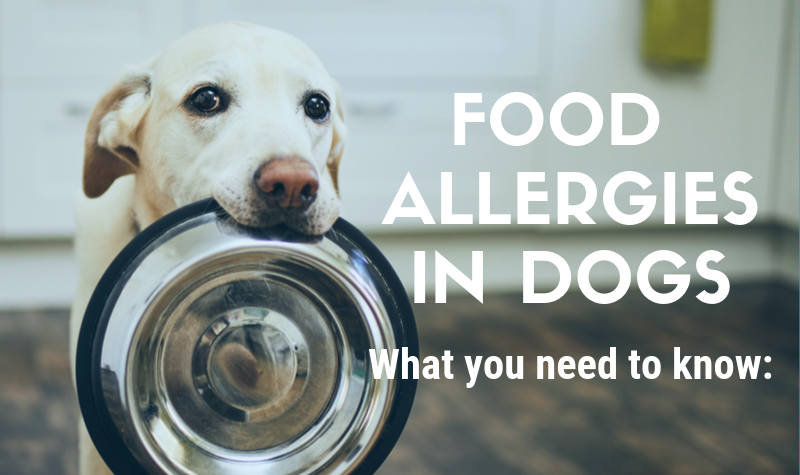Food Allergies in Dogs and Holistic Remedies
Food allergies manifest differently in dogs than in humans. For us humans, when one is allergic to a certain food like seafood, either we end up with a hideous rash or worse, a swollen throat blocking our airpipe. For dogs, it’s a bit tricky. The most common complaint is non-seasonal itching, scratching, hair loss, redness, paw licking, anal licking, skin infections, vomiting and diarrhea. Another symptom is recurring ear infection. This, however, are very common symptoms and can be caused by other things and not necessarily due to food allergy.

How to identify food allergy from other allergies?
Development of food allergies in dogs takes time. Most dogs are exposed or have eaten a certain allergen for at least 2 years. The age of onset food allergy is 2-3 years. Therefore, if dog is less than 2 years old, symptoms could be due to parasites or environmental allergy. In fact, most dogs don’t have food allergy. Only 20% are allergic to only one or two kinds of food and most of the time it’s environmental allergy.
What are the most common food allergens in dogs?
Food allergies are your dog’s immune system response to the presence of certain protein in its food. Allergy-causing proteins are not limited to meats. Grains and vegetables such as soy, wheat, corn, and potato contain some form of protein that could trigger allergic reactions. Other common food allergies are beef, chicken, egg and dairy.
What can we do to address food allergies?
Identify the Food Allergen
The most important thing is to identify the food your dog is allergic to and you can do so by going through a hypoallergenic food trial for 6 weeks to 12 weeks. Hypoallergenic food trial means exclusively feeding your dogs with a specific diet (something they’ve never had before) like one unique animal-based protein and one unique carbohydrate. Make sure you don’t feed them with any other treats.
Treat Underlying Symptoms
Your dog reacted on something his body cannot consume and caused secondary acute inflammation or an ear infection or has been continuously scratching. You can help treat and relieve your pets from these pesky symptoms and decrease the acute inflammation with these options:
- Benadryl
Benadryl is a go to conventional medicine for allergies in humans and can also be safely used on dogs. This anti-histamine also acts a mild sedative on dogs. The advisable dose is 1mg/lb, not more than 2 times per day. This can be safely be given to your dogs for 1-2 weeks.
- Licorice Tincture
Licorice root has been used as medicinal herb for centuries because of its anti-inflammatory and anti-microbial properties and it’s also perfectly safe for dogs. For acute itchiness, fur loss and allergic flare up, you can give your dog ½ ml per 20lbs of body weight, two times a day. You can give this remedy preferably for 5-7 days and may be extended up to the maximum of 2 weeks.
- Fatty acids like Flax or Fish oil
Essential fatty acids like fish oil and flax oil are underutilized and underappreciated remedy. They are not only good for the heart but also great for overall skin health and fur quality. However, it should be given on high enough levels/therapeutic levels to help control the inflammation. We are looking at the dose of 1 tablespoon per 40lbs of body weight, give once a day or 2 times per day for acute allergy. Essential fatty acids may also be given long-term at 1000mg per 10lbs of body weight daily.
- 95% Curcuminoids
Curcumin is a potent natural anti-inflammatory and pain killer which could be a good substitute for conventional non-steroidal anti-inflammatory drugs. You can give your dog 100mg per 10lbs of body weight, daily or two times per day if there’s serious allergic flair up.
- Probiotics
Probiotics are the trillions of ‘good’ essential of bacteria that live in your dog’s intestinal tract, and play a KEY role in food allergy. Often as a result of disease, inflammation, or antibiotics, the bacterial population gets altered, making your dog more prone to food allergy. It’s a great idea to then supplement with a quality probiotic supplement, focusing on these 2 probiotics, Lactobacillus Acidophilus and Bifidobacterium. It is IMPORTANT that the doses are 100million CFU’s/10lbs of body weight daily.
Hi there. My vet says my dog has had a food allergy since he was o e. He’s an Australian Labradoodle but he has signs of yeast. He has a lot of hair. Weighs around 60 lbs and those shots haven’t worked for environmental allergies. His skin is starting to show signs of irritation in his groin area, his leg, hip and sides of his body. We need help. Can you help us.